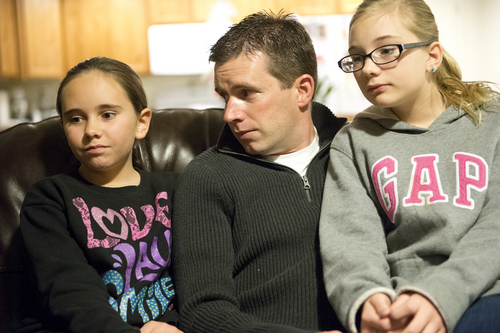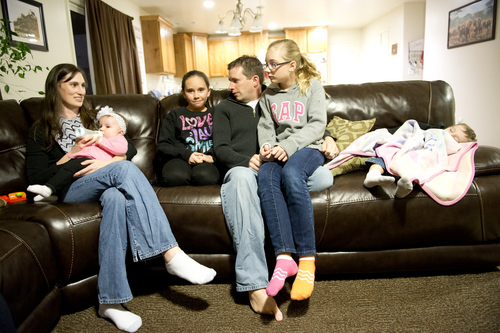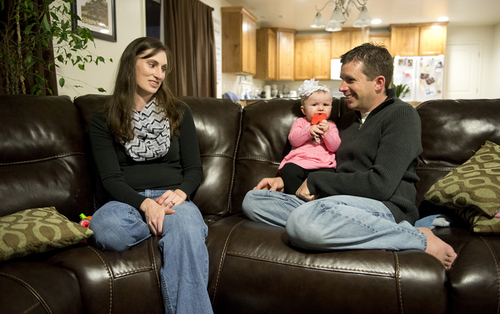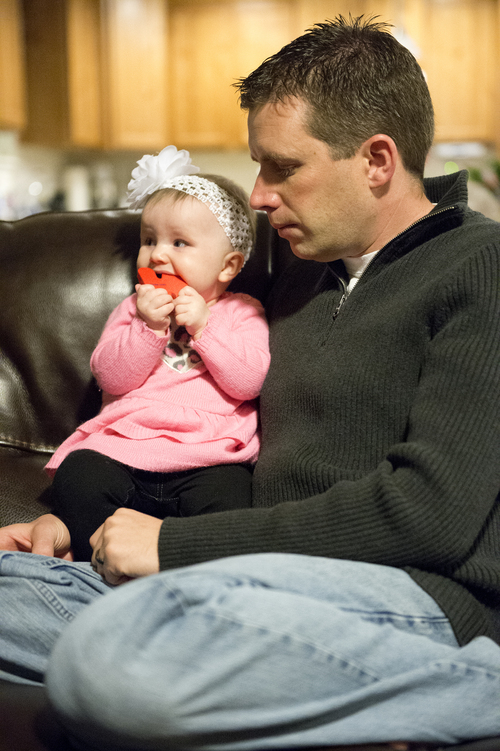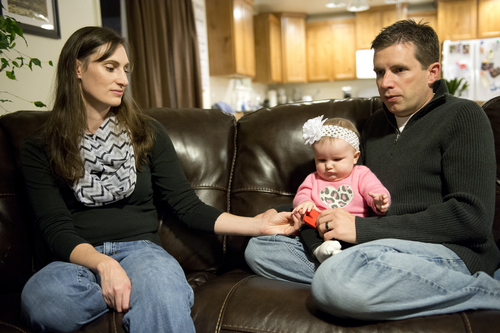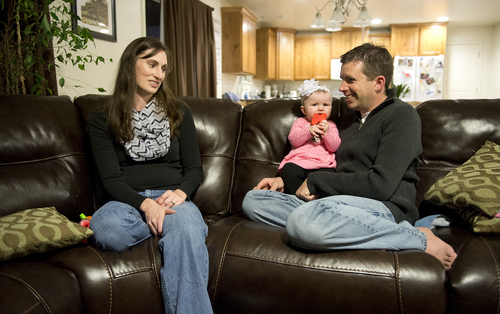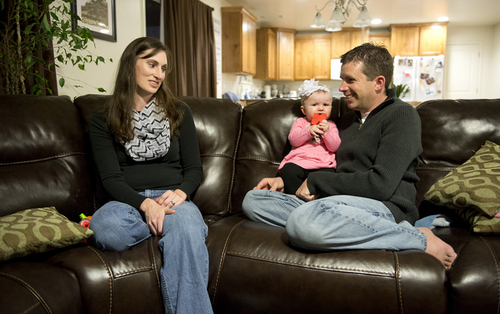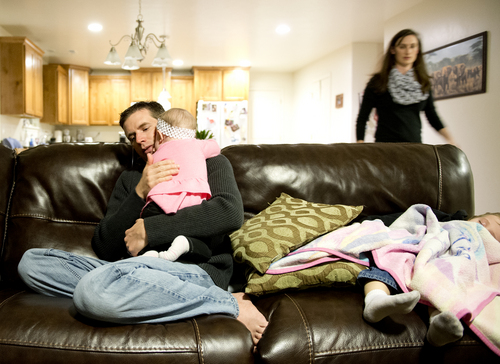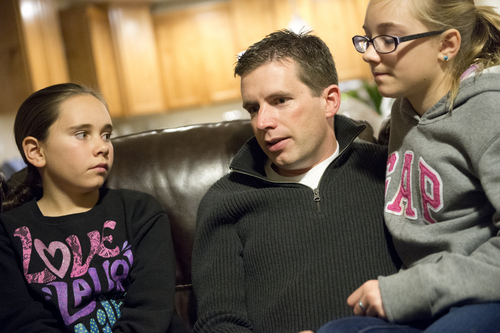This is an archived article that was published on sltrib.com in 2014, and information in the article may be outdated. It is provided only for personal research purposes and may not be reprinted.
Farmington • In sickness and in health, in good times and bad, until Mars do us part.
They weren't exactly the marriage vows Becky Sullivan agreed to, but it's increasingly looking like a reality.
Her husband of 5½ years, Ken Sullivan, has made the cut from more than 200,000 applicants to 1,058 for a one-way trip to settle the Red Planet as part of the Mars One project.
It's led to some difficult conversations around the dinner table.
"The question is do we get divorced now or get divorced later," she said Sunday night in their living room. "If I stand in the way of his dreams and passions, then we get divorced now, so I have to be supportive."
Leaving behind a wife is difficult enough, but Ken Sullivan, 38, has four children ranging in age from 6 months to 13 years old.
"I don't like it, not at all," said Kaitlyn, 12, about the thought of her dad blasting off to Mars, never to return. "When he leaves, I'd have a way to talk to him, but I can't ever see him in person again.
"It makes me sad because I'm going to miss him."
Older sister Jocelyn, 13, takes a less-sentimental approach. Some aspects of the mission excite her.
"If he wants to go to Mars," she said, "he should go to Mars."
The two are used to having a bit of a long-distance relationship with their dad. When they were 3 and 4, after an arduous divorce from his first wife, Ken Sullivan packed up and worked as a civilian contractor in Iraq fixing Black Hawk helicopters, so the idea of videoconferencing isn't foreign to them.
He currently is a medevac pilot in New Mexico and works seven days on and seven days off, though he now has sole physical custody of his girls.
He recognizes that his two eldest daughters would be grown by the time the first mission takes off, currently set for 2024, but his 3-year-old son, Kaunner, and infant daughter, Tana, would be at ages where having a dad around is crucial.
"I hope the mission is delayed by a few years," Ken Sullivan said, "maybe until Tana is 18 or so."
He says he lives by a code: Enjoy life, help people, and don't hurt others.
"I just hope the family will be able to forgive me down the road," Ken Sullivan said. "Hopefully there isn't too much hatred of my being selfish in pursuing a dream that isn't theirs."
His chances of making the final cut down to about 24 people are slim, he realizes, but exploring another world is something that intrigued him enough to make a video application and send it in before he even talked with his wife about it.
"He didn't ask my opinion," Becky Sullivan said. "It comes down to it's a dream that he wants, and I'm not taking it too seriously because it goes from more than 1,000 down to four who actually leave. It's hard to wrap my head around. He already works out of town, so we're used to the long-distance thing, but it would be hard when he doesn't come home after awhile. I couldn't do it, I couldn't leave my kids, but I've spent every day with them, and he doesn't, so I guess it's different."
Sullivan says he loves his family more than Mars, but "my desire to explore and the opportunity to do something no one has ever done before, and making a name for myself, would be nice to do."
Sullivan is one of six applicants from Utah who made the initial cut, and he spends increasing amounts of time online chatting with other applicants about what life on Mars might be like and how they'd survive and thrive if given the opportunity.
Norbert Kraft, a medical doctor who is the Chief Medical Officer for Mars One, said that leaving behind a family is not a disqualifier for applicants.
"There are some [applicants] who are married, who have boyfriends or girlfriends, and some who have children. It's their decision to make, and some are supported by family and some not at all," Kraft said. "It's how he deals with it. We have to look at how he's doing with a team and how big the baggage is."
The trip is one-way not only because there's no feasible way to launch a ship from Mars, but also because a person's bone density would decrease significantly under Martian gravity, which is a third as strong as Earth's.
"There's a point of no return for bone-density loss," Kraft said.
There are also concerns, Sullivan said, about radiation exposure during the flight and while living on Mars that would make getting home safely increasingly unlikely because the cumulative exposure on a return trip likely would prove unsafe.
The trip would take between six and seven months to complete, and the initial crew would have only four people. If everything goes according to plan, four more people would come up every two years. The reason for the time gap, Kraft said, is that Earth and Mars need to be at their closest points to reduce travel time.
"I'll be very relieved if I don't make it to Mars because it won't take me from my family," Ken Sullivan said. "But if I don't make it, it will be tough and I'll be disappointed."
Becky Sullivan looks to the future, too, and about what new adventure her husband will attempt if he doesn't get to walk on Martian soil.
"What's worse than Mars?" she said. "That's just who he is. I'm sure this won't be the last thing he wants to try."
Twitter: @sheena5427 —
From Utah to Mars
Six Utahns made the first cut of applicants from more than 200,000 to 1,058. Further cuts will come between now and 2015, eventually whittling the applicants down to about 24. Missions would consist of four people, with the first one scheduled to blast off in 2024 and subsequent missions to take off every two years. The Utahns who made the first cut are:
Jill Cramer, 63
Casey Hunter, 33
Katelyn Elizabeth Kane, 23
Cody Don Reeder, 21
Will Joshua Robbins, 28
Kenneth Ray Sullivan, 38


